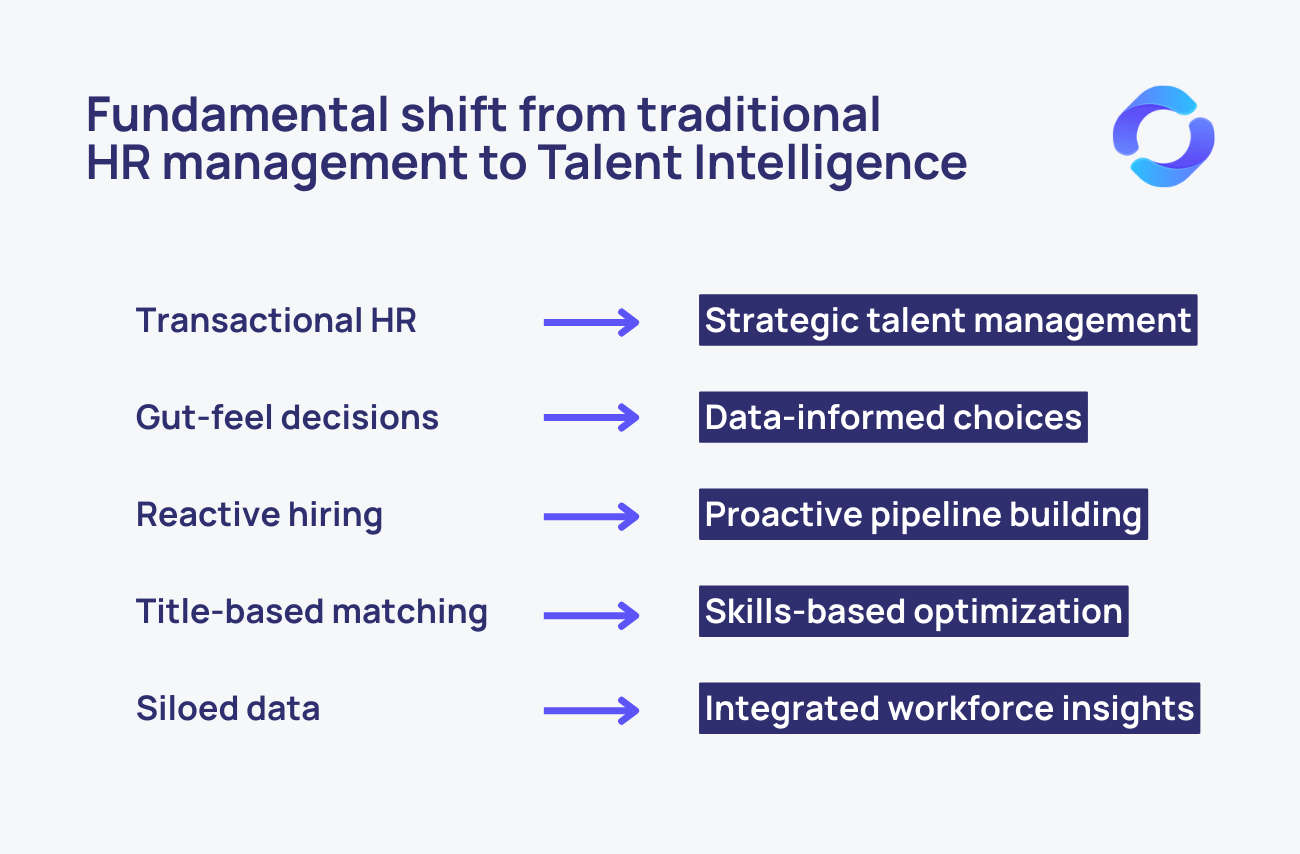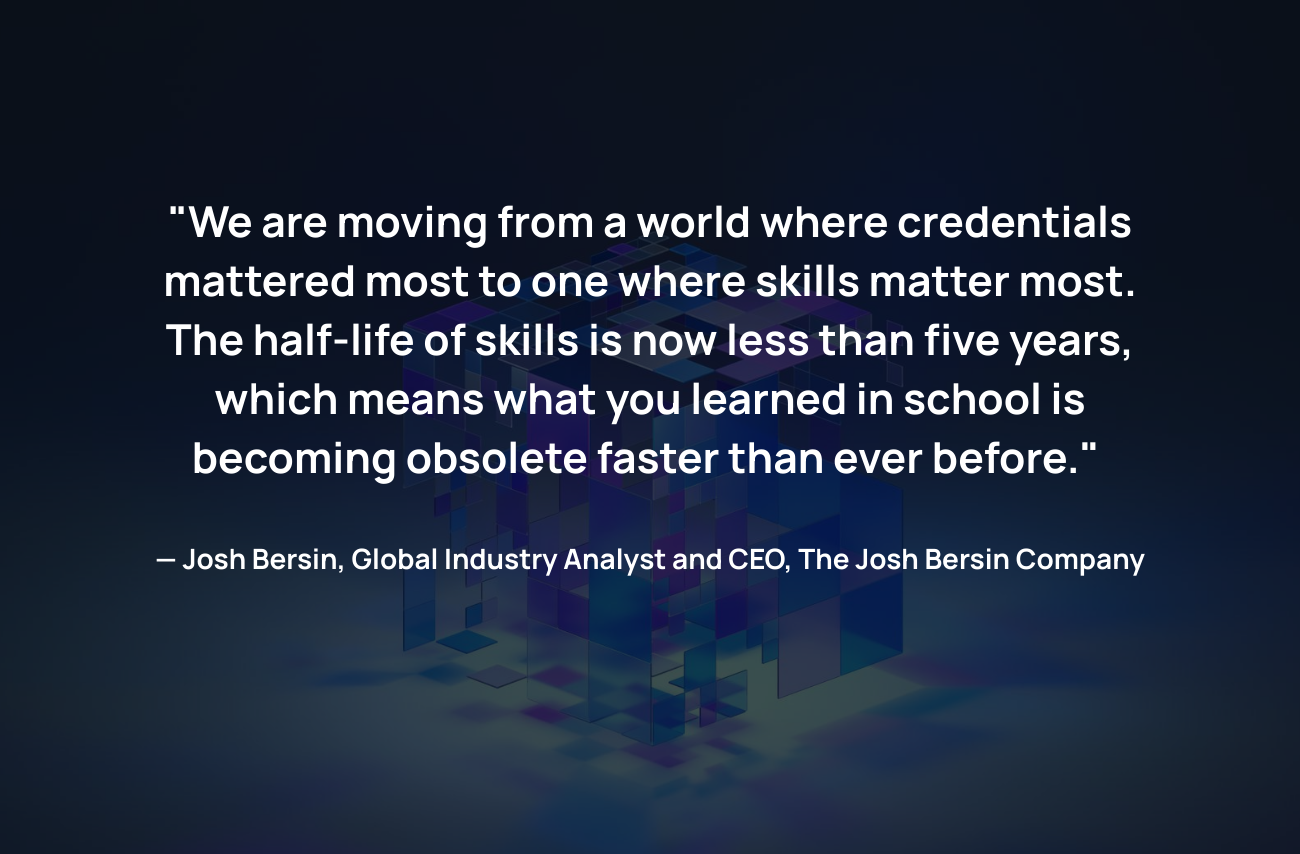The workplace is changing rapidly, driven by technological advancement, shifting job requirements, and a workforce that increasingly values adaptability and ongoing development. In this context, traditional approaches to hiring and talent management are often inadequate. Organizations that can accurately identify, map, and utilize skills are better positioned to respond to these changes.
Understanding talent intelligence
Talent Intelligence is the practice of systematically collecting, analyzing, and applying comprehensive workforce data both internal (employee skills, performance, career trajectories) and external (labor market trends, competitor movements, skills supply/demand) to make informed, strategic talent decisions that align with business objectives.
Talent intelligence marks a shift from intuition-based decisions to data-driven insights on people’s abilities. Unlike traditional HR, which centers on job titles and tenure, talent intelligence platforms assess skills, competencies, and potential. This gives real-time insights into employees’ actual abilities, not just their job descriptions.

This shift is significant because modern businesses operate in environments where market conditions and customer demands are constantly changing. Organizations that have a detailed understanding of their workforce’s skills are better able to adapt to these changes.
Skills as the new currency of work
Skills are becoming the primary measure of professional value. Job roles are increasingly fluid, with employees working across domains and adapting to new technologies. As technical skills evolve and become obsolete more quickly, ongoing learning and reskilling are essential for both individual and organizational growth.
A focus on skills introduces both opportunities and challenges. Employees can pursue career paths that reflect their capabilities, rather than being limited by traditional hierarchies. For organizations, this approach enables more effective deployment of talent by matching people to roles based on skills alignment. Achieving this, however, depends on having systems in place to accurately track, analyze, and match skills to business needs.
This shift affects not only individual roles but also the organization's overall structure. Teams are increasingly formed around the skills needed for specific projects, and employees move between departments as their transferable skills are recognized. Career development becomes more targeted, with training focused on addressing specific skill gaps.

Embrace the skills-based transformation.
Organizations are increasingly required to adapt to remain competitive. Adopting a skills-based approach is becoming increasingly necessary for long-term success. Traditional structures built around fixed hierarchies and static job descriptions are often insufficient for today’s market demands.
Adopting a skills-based approach necessitates that organizations reassess their perspective on their workforce. Rather than seeing employees solely as resources for specific functions, organizations can benefit from recognizing the workforce as a network of capabilities. This perspective supports more strategic workforce planning, more effective team formation, and greater agility in responding to new opportunities.
The benefits of a skills-based approach go beyond operational efficiency. Organizations that implement these methods often see higher employee engagement, better retention, and increased innovation. When employees can utilize a broader range of their skills and continue developing new ones, they are more likely to be engaged and contribute more effectively.
Bringing agility to the forefront
TalentsForce platform is based on the idea that work is changing and skill sets are expanding. Organizations that have a clear understanding of their skills landscape are better able to adapt to changing market conditions, new technologies, and shifting customer needs.
TalentsForce aims to help organizations manage talent in dynamic environments by providing real-time visibility into skill distribution, identifying skill gaps early, and suggesting team compositions for specific projects. By linking individual capabilities to business objectives, the platform supports more informed decision-making.
The skills-based approach recognizes that talent is fundamentally human, data is empowering, and agility is the key to sustainable growth. This philosophy drives every feature and capability, ensuring that technology enhances human potential rather than replacing it.




